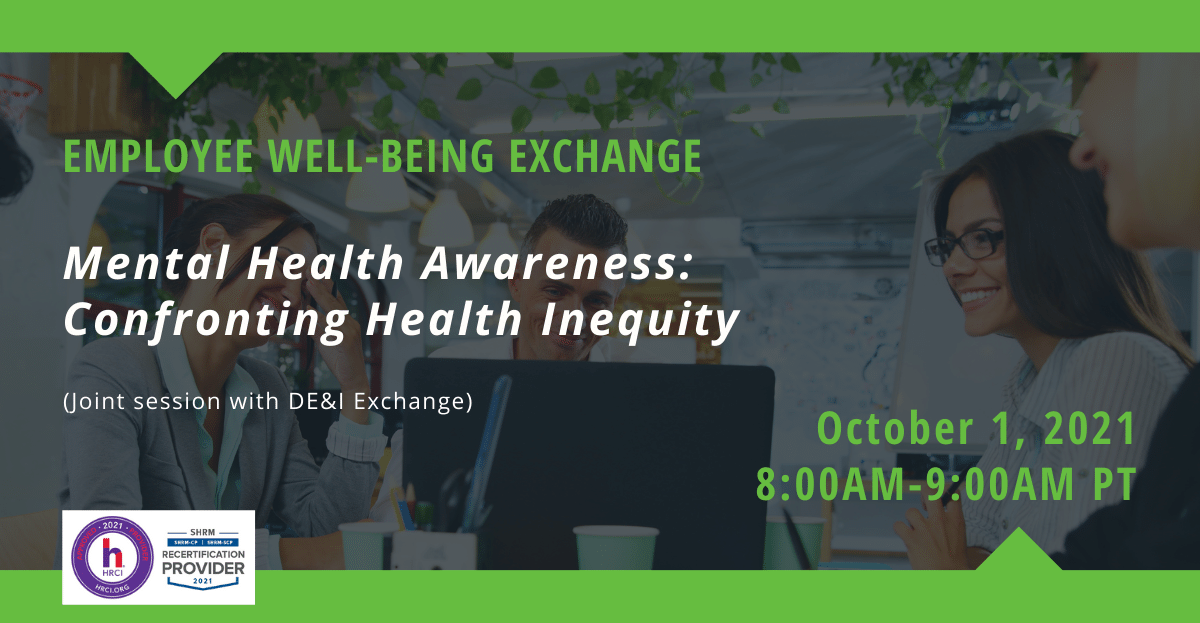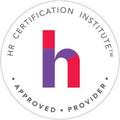
Mental Health Awareness
October is Mental Health Awareness Month. Over the last couple years, the inequalities and lack of awareness around mental health have become increasingly stark. Our intersectional identities also impact our mental health and care access in a variety of ways. In this session, the Employee Well-being and the Diversity, Equity, and Inclusion Exchange are coming together for their first joint meeting to explore how to best promote equitable mental and emotional support for employees.
Mental health is becoming a shared challenge for both Total Rewards, Employee Experience, and Diversity, Equity & Inclusion leaders. Members pointed out that the US mental health crisis is nothing new but has come into the spotlight for a wider (and whiter), more privileged portion of the population since the onset of the Covid-19 pandemic. For challenges as systemic and holistic as mental health and employee well-being, collaboration across (and possibly outside of) the organization is key.
Based on poll in the meeting, most organizations felt that mental health was becoming more openly discussed in their workplace, however they raised concern that there is not enough action to accompany the discussion. Further, it’s important to consider who is engaging in the conversation. It’s critical that the dialogue around well-being be invoked by senior leadership instead of straight from HR. Rather, HR can empower executives, managers, and employees with the tools to have honest conversations about mental health at work.
Below are the four main questions we explored and a set of responses from members:
How are you addressing mental health stigma / identity stigma in the workplace?
- As with most culture work, senior leadership should be prepared to model the behavior change. In this case, some member organizations have developed campaigns of senior leaders talking honestly and openly about their struggle with mental health to help normalize it within the organization. At Independent Health, the CEO assembled a mental health committee at the start of the pandemic, which has helped to adapt their well-being programs to focus more on mental health screening and support.
- Work directly with EAP provider to hold targeted information sessions with specific departments or teams, starting with leaders and then cascading down – bring the tools to the employee, rather than putting the onus on the employees to go find the resources
- Develop an annual well-being campaign calendar to continue the focus on well-being year round and tackle a range of issues
- Educate employees about invisible disabilities, including depression and anxiety
- Kaiser Permanente has developed a “Stigma Index” to monitor and reduce mental health stigma based on a series of survey questions
- VF Corp purchased "Notice. Talk. Act @Work" from the American Psychiatric Association Foundation as an e-Learning training module that supports leaders, managers, and supervisors
What new health support modalities / access points have you offered to employees?
- Several members are offering Mental Health First Aid Training to all employees. Kaiser Permanente has made this training mandatory at certain manager trainings (like Rise and Renew). Consider this as important as CPR training in an office
- National Council for Mental Wellbeing offers a workplace training, which more than 200 companies—including Bank of America, Gillette, Starbucks and Unilever—have offered one or both of its four- and eight-hour training programs to employees.
- Members are adding more Paid Time Off (PTO) days to the annual calendar and adding communication to encourage all staff to utilize their days off
- F5 Networks is re-adding 4 Mental Health Days (1 per Quarter) in 2022 supported by messaging from the CEO & CHRO to use these days however the individual deems fit and showing appreciation for their work
- F5 Networks is celebrating World Mental Health Day on October 10 with 24 hours of fun and refreshing virtual “take a break from work” activities, including body percussion and farm animal visits, on the following Monday
- Foresters Financial has offered unlimited sick days and has educated managers on the importance of taking time off
- The World Bank called out five mental health days instead of adding sick days to ensure staff knew they can/should take these days off
- Kelly Services is adding mental health and well-being in 2022
- Genentech recommends picking a dedicated Wellness Day (they do Fridays to also allow for a long weekend) versus allowing ad hoc usage to avoid the feeling of coming back to a full email inbox. They found that employees loved that the entire company recognized these and it reduced stress of returning from PTO.
- Offering regular or rotating weekly mindfulness, nutrition, stress management, and virtual yoga sessions
How are you communicating about mental health benefits and programs in your organization?
- Gilead is adding fun activities to celebrate their Open Enrollment day, including a caricaturist, musicians and a tour of a goat farm
- Foresters Financial began using Disco, a culture platform for remote teams, to support employee recognition and engagement over MS Teams.
- Pemco has developed a new communication tool called, “Café PEMCO,” connected to their Inspiring & Inclusive Workplace initiative – one of their DEIB strategies. The goal is to provide opportunities for employees to engage, build inclusive relationships, build trust, and grow the connection they feel toward PEMCO while learning about the diverse and unique people they work with, no matter where they are working from.
- A member in the Construction Industry shared a very visible program called, “Arrive Safe. Work Safe. Home Safe” for a group of 8,000 employees supporting a job site. They used a creative version of bingo using stickers for their safety-helmets sticker game with simple and clear well-being and inclusion reminders. This created an inclusive and energizing culture across all teams.
- US Steel is working on implementing a successful program called 20-20-20 program that encourages employees to stop every 20 minutes and look around for 20 seconds all everyone within 20 feet of them to check-in on safety and well-being.
How are you ensuring collaboration between DEI and Well-being?
- F5 Networks, Froedtert Health, and VF Corp heard from employees and ERG groups that there was very little supply of diverse therapists available during the pandemic to today. F5 handled this by working with their insurance provider to remove penalties for out-of-network providers. Froedtert Health decided to choose an new health insurance provider all together. VF Corp also worked with their provider to increase diversity of providers within network and began offering computerized cognitive behavioral therapy to all associates.
- Gilead meets monthly with one of its ERGs and is working together with its LGBTQ+ ERG to consider offering inclusive health advocacy for that community
- The World Bank’s HR Well-being strategies are being developed with ample input from employees at every level in the organization through working groups and outreach consultation
- To avoid overburdening ERGs, Froedtert Health has the groups create workplans with ERGs supporting areas of priority focus. All other requests are filtered through DEI. They leverage existing meetings to get their feedback.
Building on groundbreaking research by both i4cp and Rob Cross, the Employee Well-Being Exchange is a peer-driven community working group that explores the relational sources of well-being, how personal networks impact this, and the tools to support individual performance and well-being.
log in

